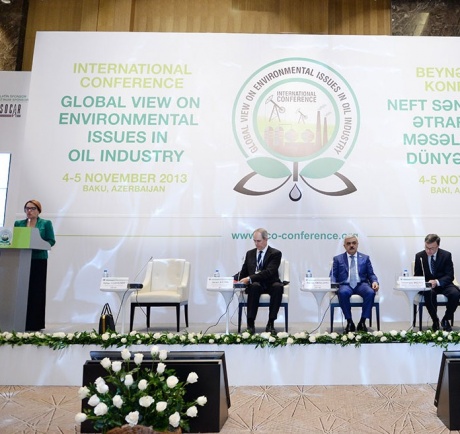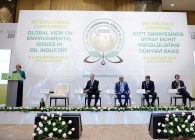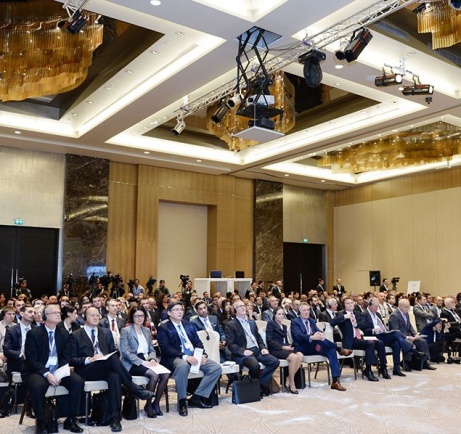
We've been setting this exhibition up for nearly two years. I believe that its language – the language of Art – eloquently conveys the great accomplishments our country has made in all spheres of achievement.

An international conference titled “Global view on environmental issues in the oil industry” kicked off in Azerbaijan’s capital Baku.
Head of Azerbaijan’s state energy company SOCAR Rovnag Abdullayev said at the opening ceremony that as a result of conducted measures, the volume of associated gas discharged to the atmosphere at the Gunashli and Oil Rocks oil and gas fields was reduced by 560 million cubic meters.
Speaking about SOCAR’s cooperation with British BP Company, Abdullayev said that the companies managed to reduce the flared gas in the giant Azeri-Chirag-Gunashli (AGC) block of oil and gas fields in Azerbaijan’s share of the Caspian Sea and in the Sangachal oil terminal.
“The reduction, in turn, led to an increase in the volume of associated gas delivered by BP,” he said.
Abdullayev also stressed the positive impact of constructing a new oil and gas processing complex on the ecological situation.
He went on to note that old oil refineries are planned to be dismantled. “Furthermore, construction of the complex will be positively observed in the ecological situation of Sumgayit where the chemical production unit is located.”
Speaking at the event, Ecology and Natural Resources Minister Huseyngulu Bagirov said that it is impossible to eliminate pollution and the subsequent environmental impact of oil production in Azerbaijan in the short term.
According to him, 1.5 billion tons of oil was produced by late 2011 which is an indication of the scale of pollution of the country’s ecology, particularly in the period of ecological ignorance. The elimination of these effects lie on SOCAR, which jointly with the Ecology and Natural Resources Ministry, is actively working to clean up polluted land and improve the environmental situation in the Absheron Peninsula.
“The total land area contaminated by the oil industry development is 35,000 hectares. Some 15,000 hectares of the mentioned amount were subjected to very heavy pollution,” Bagirov said.
Referring to work conducted in the country in the field of ecology, Bagirov said that in the past 10 years, eight national parks were established in Azerbaijan and currently work is underway to establish another.
“In the period under review, the protected areas increased from 400,000 hectares to one million hectares. Also during this period, in order to improve the environmental situation, over a million trees have been planted.”
A member of British House of Lords, Lord Peter Mandelson, also made a speech at the event. He said that the project envisaging delivery of Azerbaijani gas from the giant Shah Deniz gas condensate field to Europe will become one of the largest construction-engineering projects in the world.
According to Mandelson, the project is being carried out with the participation of British BP company.
Mandelson, also the head of Global Counsel International Consulting Company, noted that cooperation between SOCAR and BP laid the foundation of success for both companies.
A message from Leyla Aliyeva, the Vice-President of the Heydar Aliyev Foundation and the Director of the International Dialogue for Environmental Action (IDEA), was also read out in the event.
The message said that the global ecological problems require a global approach to their settlement.
“The concern caused by the ecological problems in the world forces each of us to think thoroughly,” the statement said. “An innovative approach is constantly required to more effectively protect nature”.
“IDEA is trying to create an international dialogue to protect the environment,” the statement said.
“We consider ’Green thinking’ approach and propaganda as the main principles of our activity to resolve the ecological problems,” Leyla Aliyeva said.
Ms Aliyeva also said that the environmental protection must become the common philosophy of life for all the people living on earth.
“IDEA is working on new projects to strengthen the ecological enlightenment,” the statement said. “The future ecological state of our planet will depend on the thinking of today’s generation. Of course, to think about the ecology means to think about the future.”
According to Ms Aliyeva, the current demographic changes, the expansion of industry, the growth of the human impact on the environment are turning the ecological responsibility into the main challenge of present time.
“We must mobilize all opportunities to attract more attention to the environmental protection,” the statement said. “I am very glad that this conference opens a new platform to discuss the solutions to the global ecological problems. I wish success to the conference.”




